What next for the Holyrood inquiry with no Alex Salmond?
- Published
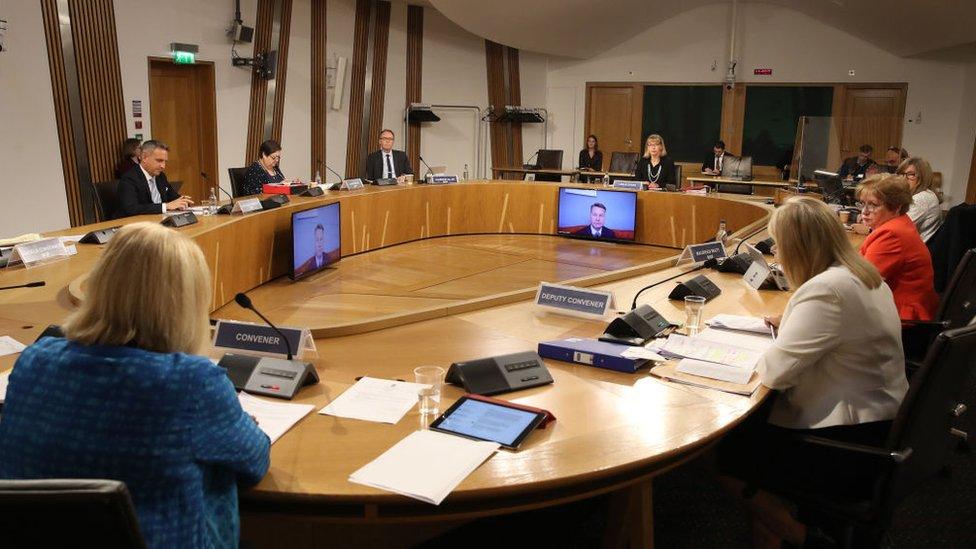
The inquiry committee has been moving between virtual and in-person meetings during the pandemic
MSPs investigating the Scottish government's botched handling of complaints against Alex Salmond will now have to do so without questioning the former first minister, after the two sides failed to come to an agreement.
With only weeks left only weeks left for the committee to take evidence and members unable to hear from a key witness, where does this leave the inquiry?

What's happening?
Alex Salmond had been widely expected to attend a meeting on Tuesday of a Holyrood inquiry into the government's mishandling of sexual harassment complaints against him.
The session was expected to see the escalating row between Mr Salmond and his successor in Bute House, Nicola Sturgeon, enter its endgame.
However, the meeting was called off as the latest development in a long-running dispute between the former first minster and the committee over what evidence could be produced and published.
And it has now been confirmed that Mr Salmond will not appear at all, after the committee said he had set conditions that they "simply could never meet".
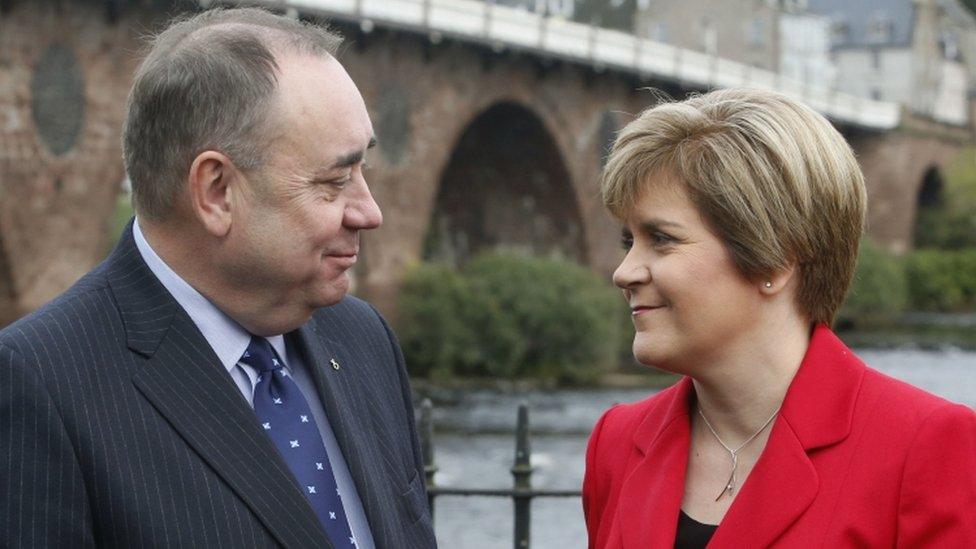
Alex Salmond and Nicola Sturgeon are the final witnesses to appear before the Holyrood inquiry
What next for the committee?
MSPs will be comforted by the fact the most important witness of all - Ms Sturgeon - is still on track to attend, and indeed says she is looking forward to putting her side of the story.
However the group is increasingly divided over its approach, particularly in the wake of the row over Mr Salmond's evidence.
The former first minister wanted the group to publish a submission he made which alleges in detail that Ms Sturgeon broke the ministerial code.
He said he could not live up to an oath to "tell the whole truth" without being able to refer to this document, and that the group cannot make a full report without taking it into consideration.
In a private meeting, the committee voted by five to four not to publish the submission, with a spokeswoman saying there were parts of the paper which did not comply with the parliament's data handling obligations.
Members also rejected publishing a redacted version of the submission by the same margin, arguing that this has been rendered pointless by the fact the full submission has since been posted elsewhere online.
Convener Linda Fabiani wrote to Mr Salmond to say that MSPs "must complete evidence taking without further delay", given they must complete their work before Holyrood breaks up in March ahead of the coming election.
They will now move on to question Ms Sturgeon before trying to agree a final report - a real challenge, given the splits in the group and the time left available.
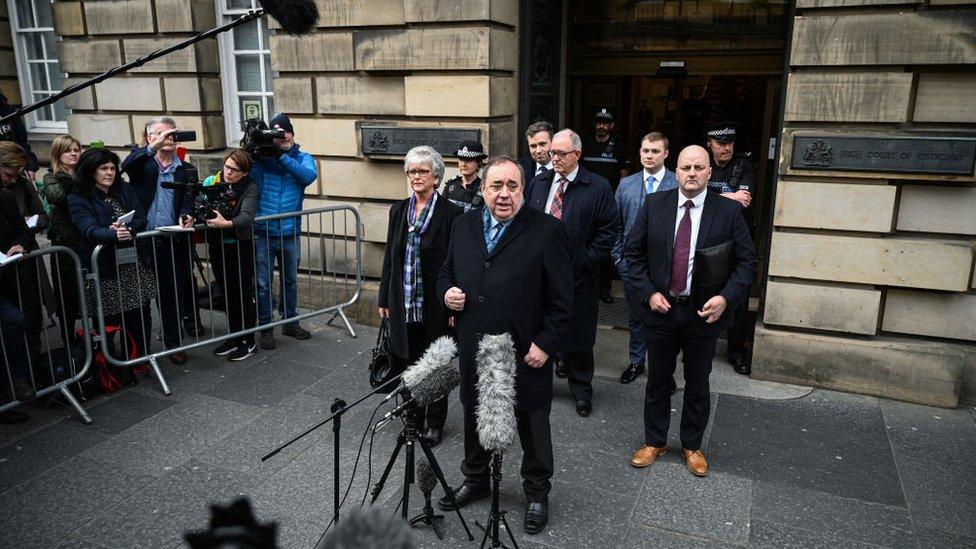
Mr Salmond was acquitted of charges of sexual assault following a trial in March 2020
What might Alex Salmond do instead?
There have been suggestions that Mr Salmond might hold a news conference of some kind instead of appearing at Holyrood.
He has, after all, been waiting almost a year to have his say. He walked free from the High Court last March on the very day the Covid-19 lockdown was imposed, saying there was "certain evidence" he wanted to come to light - but noting that it would have to wait.
A press conference would give Mr Salmond greater control over a number of key matters. These include the timing - he could have his say after Nicola Sturgeon's evidence session, and thus the "last word" - and crucially the content, being bound only by the advice of his own lawyers rather than those of the parliament.
He also would not be facing questions from a panel of his political rivals, a grilling under oath about a sensitive subject - but instead sparring with the press, something he rather enjoyed as first minister.
However, while such a session would attract plenty of attention, it would not have the same gravitas as a Holyrood appearance. Any allegations he levelled might not have the same legitimacy coming from behind a home-made podium as they would in a parliamentary setting.
What exactly he opts to do may depend on what Mr Salmond's ultimate goal is. If he just wants to state his own position, even a written statement would suffice.
But if he is looking for some greater outcome - ranging from heads rolling at an official level to the potential downfall of Ms Sturgeon herself - then he may need to seek a larger platform.
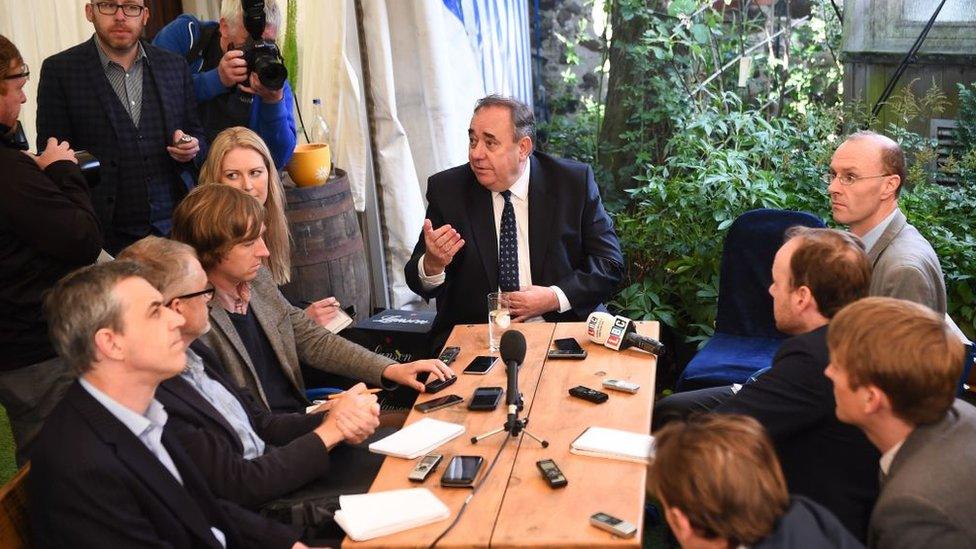
It has been suggested that Alex Salmond may look to hold a press conference instead of attending at Holyrood
What will opposition MSPs do?
There has been much disquiet from opposition members in particular about the way the inquiry has played out - and how it keeps running into walls.
The votes on publishing Mr Salmond's submission brought divisions to the fore, with the four SNP members being backed by independent MSP Andy Wightman - and the Conservative, Labour and Lib Dem members defeated.
Labour's Jackie Baillie said the move was a "blow to the credibility of the committee", while Tory Murdo Fraser said it was "hugely disappointing". Lib Dem Alex Cole-Hamilton had already described the group as being in "crisis".
There have been reports, external that some members may consider resigning in protest.
However, this may be unlikely before Ms Sturgeon gives evidence - members will not want to forfeit the chance to quiz the first minister.
But after that, they face the prospect of trying to hash out a report, despite partisan divisions over what it should say and potentially only a partial set of evidence to draw from.
It may be that some members calculate that they could make a bigger splash by simply blowing the whole thing up and walking away from the committee - but this would be very much a last resort.
What does it mean for Nicola Sturgeon?
The drama over Mr Salmond's appearance is in a way simply a distraction for Ms Sturgeon - firstly from the Covid-19 pandemic, but also from her own upcoming witness session.
What her predecessor does will not change the substance of what the FM needs to do, which is to conclusively settle the questions over what she knew and when.
Of course, the committee may not have the final word on that matter. The more significant investigation may well be that of James Hamilton, the independent advisor on the ministerial code.
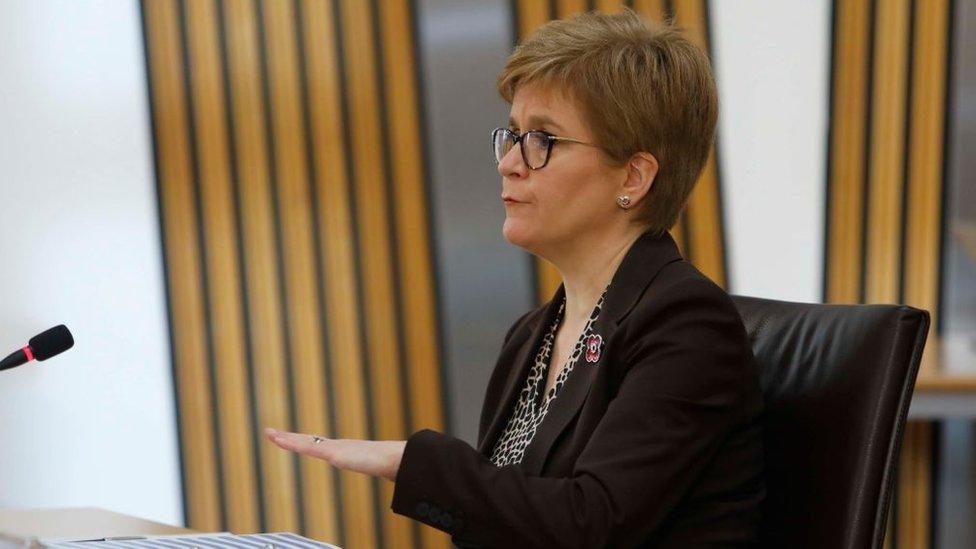
Committee members are unlikely to want to give up the chance to question Nicola Sturgeon
While the committee's remit is primarily about failings in government procedures and their application, Mr Hamilton's probe will answer a much more straightforward question, of whether or not the first minister misled parliament and broke her own code of conduct, and thus his findings may prove far more significant.
Mr Salmond may have already drawn this conclusion - his controversial submission was originally made to Mr Hamilton - and he may have opted to place less emphasis on the committee because of it.
However, this is not something Ms Sturgeon can afford to do. As first minister she will have to answer to both investigations, and there will be intense scrutiny on her witness session whenever it eventually comes.
When the history of the Holyrood inquiry is written, it might be concluded that it was boxed in from the very outset by its remit and by court orders, by partisan divisions and the necessity that it not cut across or re-run any of the criminal proceedings.
That said, it could still play a pivotal role in the future of the current first minister.